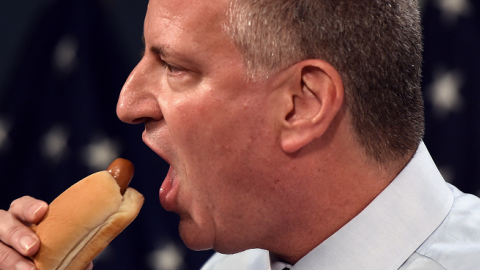After celebrating our Declaration of Independence from the British oppressor, we will return to work Monday having consumed 155 million hot dogs and, for some 41 million of us, bucked traffic jams, long security lines at airports, or storm-induced flight delays in order to visit family or whatever place attracts us in this huge country of ours.
The weekend began on a high note after a modestly strong jobs report on Thursday. Non-farm payroll employment, the "jobs" in the "jobs report," rose by 288,000 in June, and the figures for April and May were revised upward by 29,000 jobs. The unemployment rate fell to 6.1 percent-the lowest since September 2008-from 6.3 percent in May, and the number of long-term unemployed (more than 27 weeks) fell by almost 300,000, bringing the decline for the past year to 1.2 million, attributable in part to the increase in the incentive to job-hunt created by the expiration of the extension of unemployment benefits at the end of last year. June completed the first five-month run of better-than-200,000 job creation since the boom years of the late 1990s.
Unfortunately, the labor force participation rate-the share of the population either working or looking for work-remains at the lowest level in around thirty years. Also on the dreary side of the ledger:
* the number of workers involuntarily working part-time rose by 275,000,
* new jobs are mostly in the low-paying retail, hospitality, and health-care sectors, which is why average hourly earnings are up only 2 percentin the past year, and
* the broader measure of unemployment, which includes workers too discouraged to look for work, and therefore not counted in the official unemployment figure of 6.1 percent, and workers involuntarily working short hours, may have dropped to 12.1 percent from 14.2 percent last year, but that means that 19 million Americans still can't find suitable work.
Still, the jobs market is strengthening, although in my contrarian view not sufficiently to prompt Janet Yellen's Fed to move forward whatever date she and her colleagues have in mind for increasing interest rates. Yellen says she will think the labor market is strong enough to withstand the effect of a growth-slowing interest rate increase when wages start to rise significantly, which they have not yet done.
More cheering for most observers is the fact that the dreary first quarter, during which GDP declined by a staggering 2.9 percent, is now behind us. All eyes are on the second half, during which most analysts expect the economy to grow at something like a 3.5 percent annual rate. The auto industry is doing its share to keep the recovery rolling. June was the strongest sales month since before the recession. Dealers moved the metal, as trade jargon would have it, at an annual rate of 16.98 million vehicles, up from 15.88 million last year. Although General Motors has had to recall millions of cars for safety reasons, its sales are up as millions of customers bringing their cars in for service liked what they saw in the showrooms, and bought new GM vehicles. Talk about converting adversity into opportunity.
Housing, another important sector, continues to move forward, although not at the torrid pace of the recent past. Pending sales of existing homes-contracts signed with closings likely in a few months-rose 6.1 percent in May from April, but were down 5.2 percent from May of 2013. Sales of new homes in May were up by 18.6 percent compared with April, putting them at the highest level in six years. Prices are running 10 percent above last-year's levels. Builders are anticipating a good second half and further advances in the prices of their companies' shares.
Both the manufacturing and non-manufacturing (service) sectors seem to be on the upswing, although it is not clear whether they will grow at the same rate as in recent months. Fifteen of eighteen manufacturing industries covered by the Institute of Supply Management (ISM) grew last month, and the majority of service-sector industries are recording steady economic growth.
So Americans will return to work on Monday with a bounce in their steps. Well, not really. The feel-good factor has yet to make itself felt. Gasoline prices have spiked as the disintegration of Iraq proves that fracking has not made us "energy independent"-oil prices are set in an international market. Rasmussen pollsters report that 52 percent of consumers say the country is still in recession, 67 percent say the economy is unfair to the middle class, and 74 percent expect their grocery bills to rise this year.
Investors are doing well-share prices continue to hunt for the stratosphere-but are a bit uneasy since the Bank of International Settlements warned that "euphoric" financial markets are unrelated to the condition of the world's economies. The low-interest rates set by the world's central banks, say BIS economists, are merely postponing "a bigger bust later on." Critics ask the Fed to please take note.
Even Americans who feel that the recovery is about to accelerate-a view with which this observer is inclined to agree-remain unhappy. Almost two out of three Americans-63 percent-feel the country is on the wrong track. The president's approval rating is 42 percent, down from a January 2009 peak of 69 percent and well below the 62 percent recorded by Bill Clinton, the last Democrat to occupy the White House, at the same point in the electoral cycle. Congress is held in even lower esteem. The day when President Reagan and a Democratic Congress could get the nation's work done, cordially, is long past. Obama doesn't do cordial. Relations between him and the Congress have reached such a low point that Congress is preparing a legal challenge to the constitutionality of the president's decision to move on several fronts without congressional approval, and the president has invited the speaker of the House to "Sue me." Good thing he is unfamiliar with "Guys and Dolls" or he might have sung Nathan Detroit's "All right already, so nu, so sue me, sue me, what can you do me" to a Congress as unpersuaded of his desire for a congenial and enduring relationship as Adelaide was of Nathan's good intentions.
The president told us that under Obamacare we could keep our doctors, and it turns out we can't; that terrorism is on the run, and it isn't; that the slaughter at the embassy in Benghazi was due to reaction to an anti-Muslim video, and it wasn't. The Internal Revenue Service says all of the e-mails relevant to the investigation of its discrimination against conservative organizations have gone lost, and Veterans Affairs has cooked its books to conceal the long waiting-times suffered by veterans in need of care. Tens of thousands of unaccompanied children, many with infectious diseases, are crossing the porous Mexican border every day and being bussed around the country with instructions, likely to be ignored, to show up for deportation proceedings, while the president asks his team to come up with ideas by September. The nations' infrastructure is in bad shape and the highway trust fund is about to go broke. Warring House Republicans can't agree on immigration reform. All of that, plus 155 million hot dogs, is enough to create national heartburn, even if the jobs market is improving.














